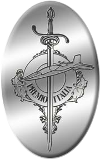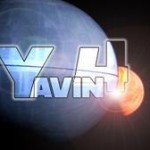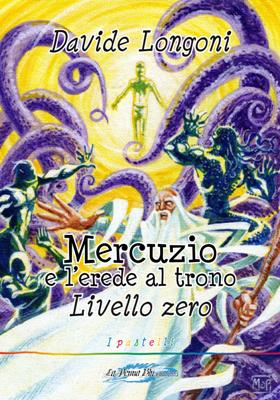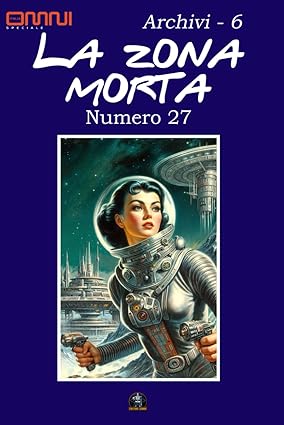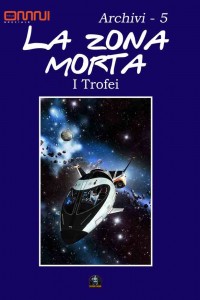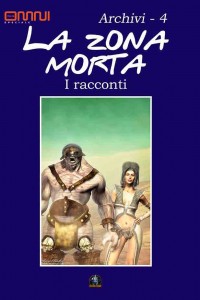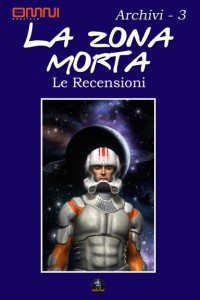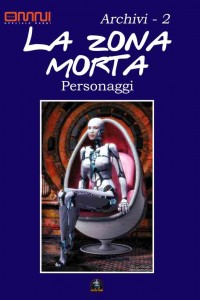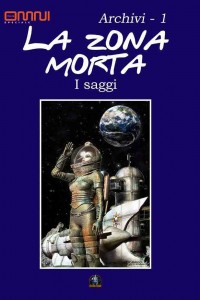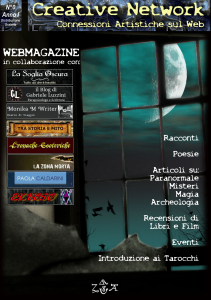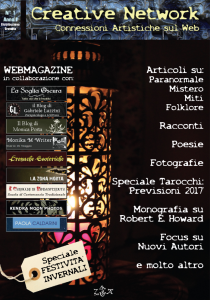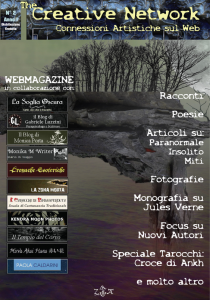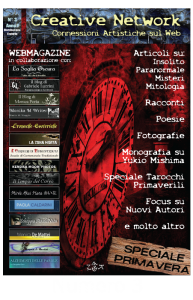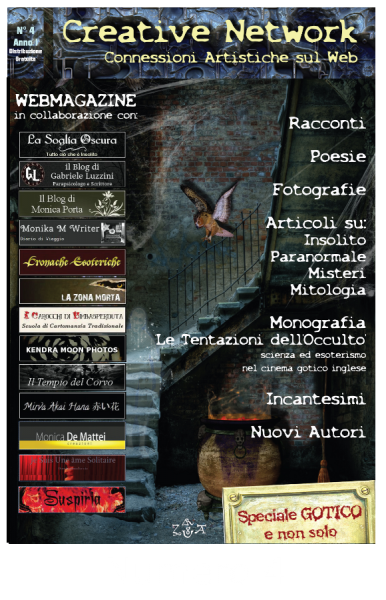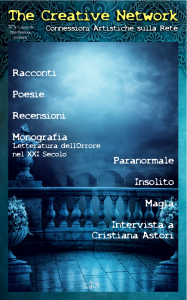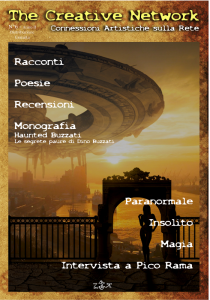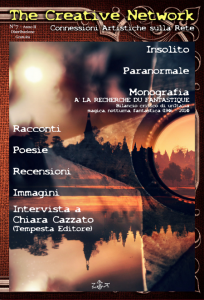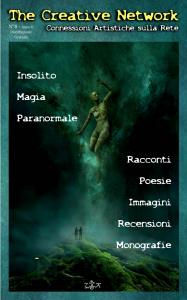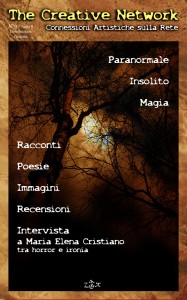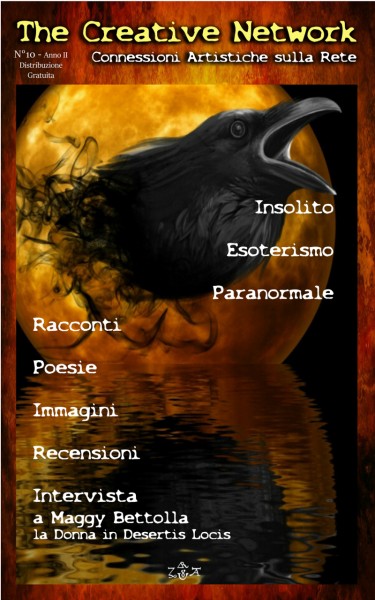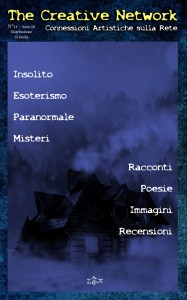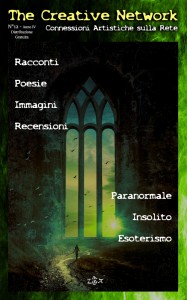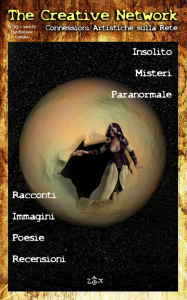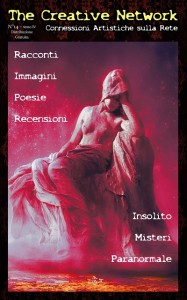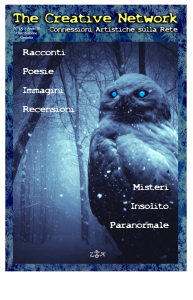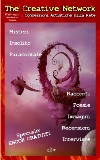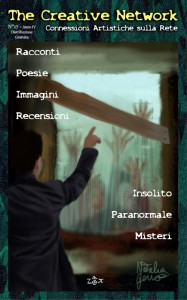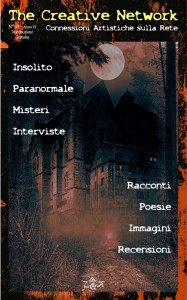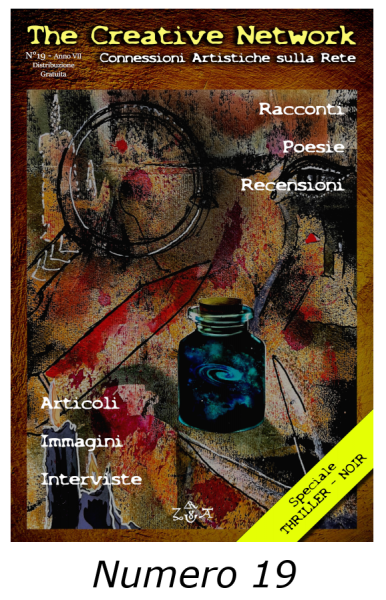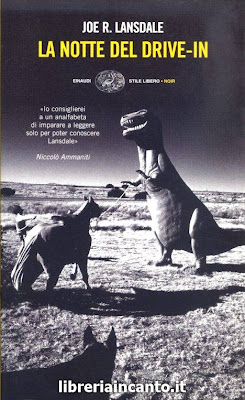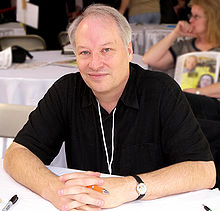 Joe Richard Harold Lansdale, per tutti semplicemente Joe R. Lansdale, è sicuramente uno dei migliori e più importanti scrittori contemporanei d’oltreoceano del fantastico, che ha saputo scrivere con la stessa passione e con la stessa carica emotiva romanzi di fantascienza, horror, noir… e molto altro ancora. Abbiamo avuto il piacere, e l’onore, di intervistarlo per voi: ecco cosa ci ha raccontato.
Joe Richard Harold Lansdale, per tutti semplicemente Joe R. Lansdale, è sicuramente uno dei migliori e più importanti scrittori contemporanei d’oltreoceano del fantastico, che ha saputo scrivere con la stessa passione e con la stessa carica emotiva romanzi di fantascienza, horror, noir… e molto altro ancora. Abbiamo avuto il piacere, e l’onore, di intervistarlo per voi: ecco cosa ci ha raccontato.
PENSO CHE SI POSSA INIZIARE DAL PRINCIPIO: CHI E’ JOE R. LANSDALE?
Non so ai come rispondere a questo genere di domanda. Tutto quello che posso dire è che sono un tipo del Texas orientale che è cresciuto povero e che voleva diventare adulto ed essere uno scrittore. Mia madre mi ha incoraggiato a leggere, e io ho letto un sacco. Ho imparato a leggere dai fumetti. Ho cominciato pensando che sarei diventato uno scrittore di fumetti, e come sarei cresciuto, mi aspettavo di scrivere part time e che eventualmente avrei preso la laurea e avrei insegnato, e ancora scritto part time, e forse quando mi sarei ritirato, avrei scritto full time. Sono contento che non sia accaduto. La scrittura è decollata e da quando avevo 29 anni scrivo full time. Ho venduto la mia prima opera quando ne avevo 21, un articolo non di fiction con mia madre sotto il suo nome. Ho fatto tutti i tipi di lavori. Tra questi il lavoro agricolo, una fabbrica di sedie di alluminio, il bidello, e così via. I miei genitori, il mio background, tutto ha contribuito a ciò che sono, insieme ad altri tipi di influenze, come ricordare la parte finale degli anni Cinquanta e diventare un teenager nei Sessanta. L’attraversamento dei Cinquanta e l’eccitazione del cambiamento nei Sessanta colpì anche me e fece di me ciò che sono, ecco tutto.
COME HAI COMINCIATO A SCRIVERE?
I fumetti mi hanno ispirato presto e volevo diventare presto uno scrittore. Volevo farlo non appena mi sono reso conto che qualcuno stava facendo i racconti che stavo leggendo. So che scrivo da quando avevo nove anni, e mia madre mi disse che avrei voluto farlo prima. Ricordo che scrivevo fumetti e li disegnavo per me stesso e la mia famiglia prima di avere nove anni, e ora che ci penso, immagino che lei avesse ragione. Non ero un buon artista, anche se mi sembrava di farlo bene. Non ero un granché con l’arte, ma presto ebbi la meglio nel raccontare storie. Sono stato influenzato nello scrivere anche da persone intorno a me che erano narratori del sud. Raccontare storie, così come i fumetti, sono state le mie prime influenze, e poi fiction di tutti i tipi da tutti i tipi di scrittori. Ma nei miei primi giorni la fantascienza nei fumetti, e anche in seguito, è stata il mio interesse principale, insieme alle storie weird, horror e i fantasy avventurosi. Ci sono stati più interessi, ma quelli erano i più importanti per me da bambino, e pensavo che sarei cresciuto per diventare uno scrittore di fantascienza. Ho scritto fantascienza, ma per la maggior parte scrivo cose che sono meno classificabili, ma ho un cuore da scrittore di fantascienza.
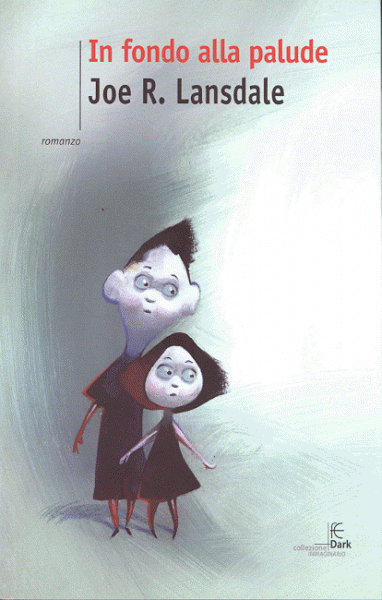 VUOI PARLARCI DEI LAVORI PRECEDENTI CHE SENTI PIU’ VICINI A TE?
VUOI PARLARCI DEI LAVORI PRECEDENTI CHE SENTI PIU’ VICINI A TE?
Li amo tutti in un modo o nell’altro. Beh, quasi tutti. I preferiti tra i primi sono THE MAGIC WAGON (in italiano IL CARRO MAGICO), THE DRIVE-IN (in italiano LA NOTTE DEL DRIVE-IN) e COLD IN JULY (in italiano FREDDO A LUGLIO). Tra quelli seguenti MUCHO MOJO (idem in italiano), THE BOTTOMS (in italiano IN FONDO ALLA PALUDE nell’ultima edizione o SOTTO GLI OCCHI DELL’ALLIGATORE nella prima versione), A FINE DARK LINE (in italiano LA SOTTILE LINEA SCURA), SUNSET AND SAWDUST (in italiano TRAMONTO E POLVERE) e il recente EDGE OF DARK WATER (in italiano ACQUA BUIA). I titoli in italiano potrebbero essere differenti. Ma i racconti sono le cose che preferisco scrivere, e ne ho scritti parecchi, alcuni dei quali sono apparsi in Italia.
TRA I TUOI LIBRI PIU’ FAMOSI, CI SONO TRE DIFFERENTI SERIE. PRIMA DI TUTTO, PUOI RACCONTARCI DE “I MISTERI DI HAP E LEONARD”?
Hap e Leonard sono apparsi in un libro intitolato qui SAVAGE SEASON (in italiano UNA STAGIONE SELVAGGIA) e non ho mai avuto intenzione di scrivere di loro ancora. Non avevo in mente una serie. Ma tre anni dopo, o giù di li, sono saltati fuori ancora in MUCHO MOJO, e poi ho iniziato a scrivere di loro regolarmente. Sono personaggi che riflettono molto di me, della cultura Americana, e allo stesso tempo sono storie di crimine e avventura. C’è più che un po’ di satira e anche di parodia e di racconto inverosimile nelle loro storie. Sono i miei personaggi preferiti tra quelli che ho creato.
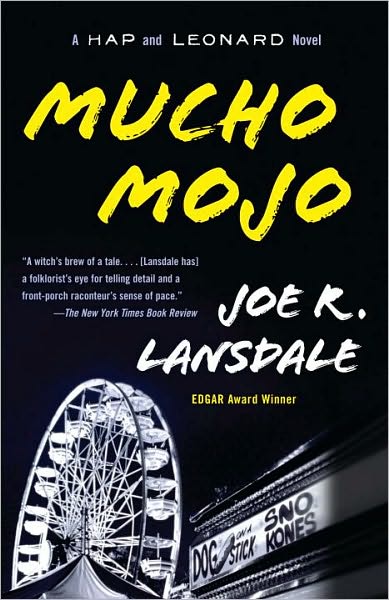 COME HAI INVENTATO LA STORIA E COME SI E’ SVILUPPATA LA SERIE?
COME HAI INVENTATO LA STORIA E COME SI E’ SVILUPPATA LA SERIE?
Stavo scrivendo un libro per la BANTAM BOOKS, e Hap divenne il personaggio principale con un certo Leonard che non avrebbe dovuto avere un grande ruolo. Ma lui continuava a tornare nel romanzo, e mi sono reso conto che loro avevano una storia e una amicizia forte, ed è questo che ha guidato il libro. Pensavo di aver finito con loro, invece tre anni dopo stavo provando a scrivere un libro che mi desse uno slancio. Hap continuava a parlare con me. Ho messo quel libro da parte per tornarci in un secondo momento, e scrissi MUCHO MOJO, lasciando che Hap parlasse con me. Lui è il mio alter-ego in qualche modo. Ho imparato di più sui ragazzi, e prima che me ne rendessi conto, ho avuto una serie. Ma è stato puramente casuale.
UN’ALTRA IMPORTANTE E FAMOSA SAGA E’ “LA SERIE DEL DRIVE-IN”: COSA PUOI DIRCI AL RIGUARDO?
Scrissi un articolo intitolato “L’inferno attraverso un parabrezza” per TWILIGHT ZONE MAGAZINE e l’articolo catturò l’attenzione di un editor, che aveva già comprato un libro da me, THE MAGIC WAGON, e mi chiese se volevo provare a scrivere un romanzo basato sull’articolo. L’editor era Pat LoBrutto, e a quel tempo lavorava per DOUBLEDAY, e lDOUBLEDAY/BANTAM. Iniziai il libro e mi diede soddisfazione. Arrivò velocemente, ma pensavo fosse la cosa peggiore che avessi mai scritto. Non mi ero divertito nel farlo. Quando fu terminato, e tornai indietro sulle bozze, iniziai a farlo in uno stato d’animo triste, ma lo trovai molto meglio di quanto avessi pensato. Avevo scritto in fretta e selvaggiamente e anche un po’ in maniera sperimentale, almeno per me, e aveva funzionato. Non sapevo che ha funzionato fino a quel momento. Mi è stato chiesto per un sequel, e il libro che ne seguì fu anche difficile, ma aveva funzionato. Molti anni dopo ho scritto un terzo capitolo della serie. Il più divertente dei tre, anche se credo che l’originale sia il migliore. Anche in questo caso, nessuna serie è stata progettato, è successo e basta.
Ho avuto l’idea dall’essere cresciuto con i Drive In e i film di serie B che proiettavano. In alcuni casi, i film di serie Z. Volevo anche scrivere qualcosa che sembrasse molto pop, ma è stato anche un libro in cui ho potuto utilizzare umorismo e satira. Ho voluto criticare e divertire allo stesso tempo. Credo che THE DRIVE IN sia uno dei miei migliori libri, e penso che un sacco di volte sia considerato solo umorismo, ma veramente per me è la cosa più dark che io abbia scritto e penso che sia un romanzo rettilineo che usa l’arredo di un genere, ma che non cerca di inserirsi in un modello di genere.
LA TUA SAGA PIU’ RECENTE E’ LA TRILOGIA DI “NED THE SEAL”. VUOI PARLARCENE?
Le storie di Ned sono solo divertimento. Tutto qui. Mi danno la possibilità di giocare con le tradizioni della vecchia fantascienza, ma hanno un tocco di sensibilità moderna. Ho pensato anche che sarebbe stato divertente parodiare i vecchi libri, mentre al tempo stesso stavo scrivendo loro una lettera d’amore. Sono le mie vacanze in un certo senso. Ci dovrebbe essere un terzo libro, ma finora non è stato ancora sviluppato.
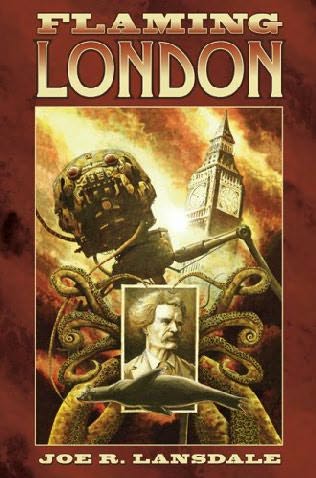 QUANDO ARRIVERA’ IL TERZO E ULTIMO VOLUME, “THE SKY DONE RIPED”?
QUANDO ARRIVERA’ IL TERZO E ULTIMO VOLUME, “THE SKY DONE RIPED”?
Non ne ho idea. Ne ho già scritto una parte, ma Ned al momento non mi sta parlando. Quando lo farà, scriverò il libro.
QUALI SONO STATE LE DIFFICOLTA’ CHE HAI INCONTRATO NELLA CREAZIONE DEI TUOI PERSONAGGI?
Di nessun personaggio è stato più duro scrivere che un di altro. Si sono tutti presentati con il loro bagaglio di gioie e problemi.
CON I TUOI LIBRI HAI VINTO MOLTI PREMI. VUOI DIRCI COME CI SI SENTE QUANDO SI VEDE CHE LE PROPRIE “CREATURE” SONO COSI’ POPOLARI E APPREZZATE?
Ho ricevuto un gran numero di premi. THE BOTTOMS ha probabilmente avuto più attenzione, e ha vinto un paio di premi, e la novella sul quale si bada, MAD DOG SUMMER, ha vinto anch’essa un premio. I premi che ho ricevuto sono il GRINZANI PRIZE, THE EDGAR, nove Bram Stokers, The British Fantasy Award, The Herodotus Award, The Inkpot Award alla carriera per il mio contributo ai fumetti. Ho anche ricevuto un Grandmaster of Horror Award dalla Horror Writers Association, The Lifetime Achievement Award, The Mid-South writers Award e così via. Questi sono i principali che ricordo al momento.
NELLA TUA CARRIERA HAI SCRITTO ROMANZI E RACCONTI: QUALI SONO LE DIFFERENZE TRA QUESTI DUE MODI DI SCRIVERE?
Si scrive allo stesso modo per entrambi. Il meglio che ti è possibile. Entrambi richiedono un po’ di un atteggiamento mentale diverso, ma è impossibile da spiegare. Qual è la differenza principale: uno è breve, l’altro è lungo.
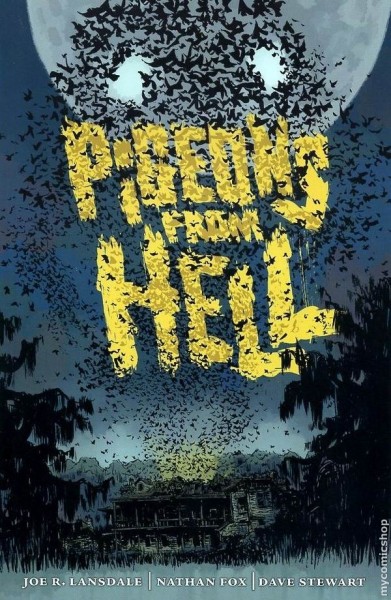 SEI ANCHE UNO SCRITTORE DI FUMETTI: COSA PUOI RACCONTARCI DI QUESTA ESPERIENZA?
SEI ANCHE UNO SCRITTORE DI FUMETTI: COSA PUOI RACCONTARCI DI QUESTA ESPERIENZA?
Amo scrivere fumetti. La cosa più ovvia è che sono stati il mio primo amore, per quanto lontano vadano le storie, secondo quanto raccontano mio padre e gli altri della famiglia, per cui scrivere fumetti è il coronamento di un sogno d’infanzia.
QUAL E’ IL RAPPORTO CHE HAI CON GLI ALTRI MEDIA, LA TELEVISIONE E IL CINEMA SOPRATTUTTO?
La televisione non era particolarmente popolare negli anni Cinquanta, nonostante esistesse già da prima, così sono stato uno dei primi bambini a crescere durante il boom dei media. Ho amato i vecchi film e i serial d’avventura che trasmettevano in TV, così come i detective show, le serie horror e fantasy, tutto questo ha avuto un ruolo nella mia immaginazione, ho anche un vago ricordo di aver ascoltato qualche show radiofonico. Stavano morendo negli anni Cinquanta, ma un certo numero di questi continuò negli anni Sessanta. Non ricordo molto di loro, tranne che ho sentito che alcuni sono cresciuti. Ma sicuramente la televisione ha ampliato il mio mondo e mi ha reso consapevole di tutti i generi e i tipi di storie. La TV non andava 24 ore al giorno come adesso. Ma tutto quello che c’era di interessante per me l’ho guardato e assorbito. Oh, e gli Western erano veramente grandi in televisione, e non c’è dubbio che ho succhiato da loro e sono stato influenzato anche da questo. Ho anche guardato un sacco di film, e come ho detto ce n’erano di tutti i tipi in TV. Ho guardato fantascienza, horror, gialli, western, musical, drammatici, l’ho detto. Questo mi portò a leggere molto. Volevo capire la storia, e quando ho cominciato a leggere ho trovato che le storie nei libri erano migliori di quelle dello schermo, ma amo comunque i film, e ho anche prodotto un film horror più tardi. E’ un film a basso costo, ma mi piace. E’ basato su una mia storia, adattata per lo schermo da mio figlio. Anche mia figlia ha avuto il suo ruolo e ha scritto parte della musica. Si tratta di un lungometraggio, e speriamo di averlo in distribuzione al più presto.
MOLTI DEI TUOI LIBRI SONO STATI TRADOTTI IN ITALIA. COSA PENSI DEL NOSTRO PAESE?
Amo l’Italia. E’ diventata come una casa quando sono via da casa. Solo vorrei poter imparare la lingua, ma per ora non ho imparato così tanto.
IN QUESTI ANNI HAI SEMPRE AVUTO UNA PREDILEZIONE PER IL FANTASTICO. CHE SIGNIFICATO HA PER TE QUESTA TEMATICA?
Non posso definirlo e non ci proverò, non posso dire altro che mi fa sentire molto bene quando trovo una storia del genere che funziona davvero. Mi trasforma. Leggere per me è come la droga per i tossicodipendenti, e sono sempre stato particolarmente colpito dal fantastico. Credo che sia stato il mio modo di allontanarmi da ciò che mi sembrava essere una vita triste mentre crescevo. Sapevo che non volevo solo crescere e ottenere un lavoro e lavorare fino alla pensione. Volevo fare qualcosa di diverso, e suppongo che in un modo o in un altro, come la maggior parte di noi quando siamo bambini, volevo essere speciale in qualche modo. La narrativa fantastica mi ha fatto sentire speciale, e dentro di me sentivo che potevo farlo, che in qualche modo ero una parte di questo.
HAI SCRITTO HORROR, FANTASCIENZA, NOIR, WESTERN… QUAL E’ IL TUO GENERE PREFERITO E PERCHE’?
La fantascienza era la favorita quand’ero più giovane, ma francamente, non ne leggo più molta, a meno che non sia la roba vecchia. Io ancora la amo, e guardo film di fantascienza, rileggo vecchie storie, qualcosa di nuovo, di tanto in tanto, ma francamente, non ho un genere preferito. Mi piacciono tutti. Penso che la narrativa fantastica sicuramente mi abbia dato un modo diverso di vedere le cose, anche quando sto scrivendo “realisticamente”.
ORA UNA DOMANDA GENERALE. DOVE TROVI L’ISPIRAZIONE PER TUTTE LE TUE STORIE?
Dappertutto.
SEI ANCHE UN ESPERTO DI ARTI MARZIALI, CHE HA CREATO LO STILE “SHEN CHUAN”. COSA PUOI DIRCI DI QUESTA PASSIONE?
Mi sono interessato di difesa personale quando ero un bambino e a 11 anni ho cominciato ad allenarmi con mio padre, che mi ha insegnato qualche tecnica della boxe e del wrestling, e un po’ di difesa personale. Sono andato avanti a studiare una serie di arti, un giorno apro gli occhi e avevo fuso il tutto e avuto il mio stile. Come molte cose nella mia vita, è stato accidentale, anche se ho sempre lavorato sodo per i miei accidenti. Sto ancora insegnando, per ora solo lezioni private, e lo stile è in crescita, lentamente. Non stiamo cercando di essere il McDonald’s delle arti marziali. Vogliamo andare piano e costruire qualcosa di qualità. Ma mi piace, e mi ha insegnato molto su come fare le cose. Focus, determinazione, e così via.
TUA MOGLIE E’ ANCHE LEI UNA SCRITTRICE. E’ PIU’ DIFFICILE O PIU’ FACILE VIVERE CON UN ALTRO SCRITTORE IN FAMIGLIA?
Karen al momento non è una scrittrice. E’ qualcuno che ha scritto un po’. Mi ha aiutato a finire una storia che non riuscivo a capire, ha scritto un’altra storia insieme a me su richiesta di un editor, e ha scritto una serie di articoli sulla The Horror Writer’s Association nei primi tempi. Ha anche co-editato un libro con me. Lei preferisce gestire il business, sia i libri che le arti marziali. Quindi non è come vivere con uno scrittore. Entrambi i miei figli, Kasey e Keith scrivono, e stanno iniziando a lasciare il segno. Kasey è un cantautore, e ha appena finito il suo primo romanzo. Keith scrive sceneggiature e fumetti ed è una giornalista.
QUALI SONO I TUOI SCRITTORI PREFERITI?
Flannery O’Conner, Harper Lee, Mark Twain, Jack London, Richard Matheson, Ray Bradbury, Cyril Kornbluth, Charles Portis, Henry Kuttner, Ernest Hemingway, John Steinbeck, Carson McCuller, William Goldman (non Golding), Larry McMurtry, anche se lo trovo un po’ un miscuglio. Raymond Chandler, James Cain, Dashiel Hammett. E la lista va avanti.
E I TUOI FILM PREFERITI?
IL BUIO OLTRE LA SIEPE, CASABLANCA, BUTCH CASSIDY, il recente IL GRINTA diretto dai Cohen, basato su uno dei miei romanzi preferiti dallo stesso titolo scritto da Charles Portis. Il film originale di IL GRINTA era buono ma il secondo è molto più fedele al libro, e penso che sia una capolavoro.
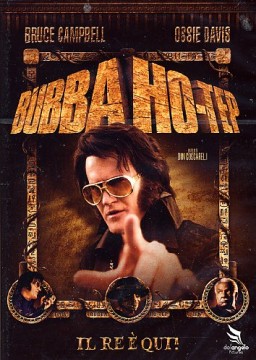 PARLANDO DI CINEMA, DOBBIAMO ASPETTARCI QUALCHE FUTURO LAVORO (FILM O SERIE TV) TRATTO DAI TUOI LIBRI?
PARLANDO DI CINEMA, DOBBIAMO ASPETTARCI QUALCHE FUTURO LAVORO (FILM O SERIE TV) TRATTO DAI TUOI LIBRI?
Sì. Molti sono in lavorazione. Non si sa mai ciò che viene girato. Già filmati sono BUBBA HO-TEP e PANICO SULLA MONTAGNA, e CHRISTMAS WITH THE DEAD, di prossima pubblicazione. So che THE PIT, basato su una mia storia è in produzione, così come FREDDO A LUGLIO, IN FONDO ALLA PALUDE, e Hap e Leonard sono stati opzionati per una serie televisiva via cavo. Nessuno di quelli in corso sarà fatto di sicuro, ma ci spero. Anche il mio nuovo romanzo, ACQUA BUIA, è stato opzionato, e molti altri. THE DRIVE IN lo è stato per un po’, ed ero entusiasta di questo, ma poi la cosa è fallita.
L’ULTIMA DOMANDA. CHE PROGETTI HAI PER IL FUTURO E QUALI SONO I TUOI SOGNI?
Continuare a fare quello che sto facendo, e continuare a divertirmi.
ED E’ QUELLO CHE CI AUGURIAMO ANCHE NOI, PER CONTINUARE A LEGGERE LE STORIE FANTASTICHE CHE ANCORA DEVI SCRIVERE.
Di seguito, come nostra consuetudine, vi lasciamo leggere la versione originale dell’intervista, chiedendo anticipatamente scusa a chi conosce bene l’inglese se la traduzione non è stata di suo gradimento.
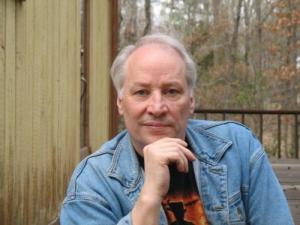 I THINK WE CAN START FROM THE BEGINNING: WHO’S JOE R LANSDALE?
I THINK WE CAN START FROM THE BEGINNING: WHO’S JOE R LANSDALE?
I never know how to answer this kind of question. All I can say is I’m a guy from East Texas who grew up poor and wanted to grow up and be a writer. My mother encouraged me to read, and I read a lot. I learned to read from comics. I started out thinking I would be a comic writer, and as I grew older, I expected I write part time and that I would have a university degree eventually and would teach, and still write part time, and maybe when I retired, write full time. I’m glad that didn’t happen. The writing took off, and by the time I was 29 I was writing full time. I sold my first piece when I was 21, a non-fiction article with my mother under her name. I worked all manner of jobs. Among them farm work, aluminum chair factory, janitor, and so on. My parents, my background, all contributed to who I am, along with other kinds of influences, like remembering the tail end of the fifties and becoming a teenager in the sixties. The crossover of the fifties and the excitement of change in the sixties affected me as well and made me who I am, what that is.
HOW DID YOU BEGIN TO WRITE?
Comics inspired me early on, and I wanted to be a writer early on. I wanted to do it as soon as I realized someone was making up the stories I was read. I know by age nine I was writing, and my mother told me I had wanted to do it before that. I do remember writing comics and drawing them for myself and family before I was nine years old, so now that I think about it, I guess she was right. I wasn’t a very good artist, though I seemed good when I was you. I just didn’t get any better at the art, but I got better fast at telling stories. I also was influenced to write by the people around me who were Southern storytellers. Storytelling, as well as comics, were my earliest influence, and then fiction of all kinds by all manner of writers. But in the early days science fiction in comics, and then later on, were my main interest, along with weird stories, ghost stories, horror, and adventure-fantasy. There were more interest in that, but those were important to me as a kid, and I thought I would grow up to be a science fiction writer. I have written science fiction, but mostly I write things that are less classifiable, but I do have a science fiction writer’s heart.
DO YOU WANT TO SPEAK US ABOUT YOUR PREVIOUS WORKS THAT YOU FEEL CLOSE TO YOU?
I love them all in one way or another. Well, almost all. Favorites of the early stuff are THE MAGIC WAGON, THE DRIVE-IN and COLD IN JULY. Later on, MUCHO MOJO, THE BOTTOMS, A FINE DARK LINE, SUNSET AND SAWDUST, and the recent EDGE OF DARK WATER. The titles in Italian would be different. But short stories are my favorite thing to write, and I’ve written a lot of them, some of which have appeared in Italy.
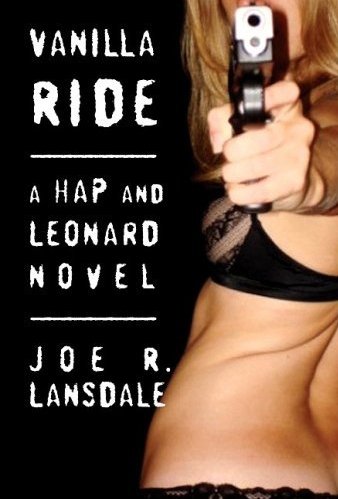 AMOUNG YOUR MOST FAMOUS BOOKS, THERE ARE THREE DIFFERENT SERIES. FIRST OF ALL, CAN YOU TELL US ABOUT “THE HAP AND LEONARD MYSTERIES”?
AMOUNG YOUR MOST FAMOUS BOOKS, THERE ARE THREE DIFFERENT SERIES. FIRST OF ALL, CAN YOU TELL US ABOUT “THE HAP AND LEONARD MYSTERIES”?
Hap and Leonard appeared in a book titled SAVAGE SEASON here, and I never intended to write about them again. I didn’t have a series in mind. But three years later, or thereabouts, they popped up again in MUCHO MOJO, and then I began to write about them regularly. They are characters that reflect a lot about me, American culture, and are at the same time crime and adventure stories. There is more than a little bit of satire and even parody and tall tale in their stories. They are my favorite characters that I’ve created.
HOW DID YOU INVENTED THE STORY AND HOW IT HAS DEVELOPED THE SERIES?
I was writing a book for BANTAM BOOKS, and Hap became the main character with Leonard someone who wasn’t supposed to have a very large role. But he kept coming back in the novel, and I realized they had a history and a powerful friendship, and that’s what drove the book. I thought I was through with them, then three years later I tried to write a book that was giving me fits. I kept having Hap speak to me. I put that book aside to return to later, and wrote MUCHO MOJO, letting Hap talk to me. He is my alter-ego in some ways. I learned more about the guys, and before I knew it, I had a series. But it was purely accidental.
ANOTHER IMPORTANT AND FAMOUS SAGA IS “THE DRIVE-IN SERIES”: WHAT CAN YOU TELL US ABOUT?
I wrote an article called “Hell Through A Windshield” for TWILIGHT ZONE MAGAZINE, and the article caught an editor’s eye, and he had already bought a book by me, THE MAGIC WAGON, and he asked me if I wanted to try a novel based on the article. The editor was Pat LoBrutto, and at that time he worked for DOUBLEDAY, and lDOUBLEDAY/BANTAM. I started the book, and it gave me fits. It came quickly, but I thought it was the worst thing I had ever written. I didn’t have fun doing it. When it was finished, and I got back the page proofs, I started through it in a glum mood, but found it to be far better than I had assumed. I had written it fast and savage and somewhat experimentally, at least for me, and it had worked. I didn’t know it worked until that moment. I was asked for a sequel, and the book that followed was also difficult, but it too turned out well. Many years later I wrote a third in the series. The most fun of the three, though I think the original is the best. Again, no series was planned, it just happened.
HOW DID YOU GET THE IDEA?
I got the idea from having grown up on Drive Ins and on the B movies they showed. In some cases, Z movies. I also wanted to write something that seemed very pop, but was also a book where I could utilize humor and satire. I wanted to criticize and entertain at the same time. I think THE DRIVE IN is one of my best books, and I think a lot of times it’s considered just humor, but it’s really to me the darkest thing I ever wrote, and I think of it as a straight novel using genre furniture but not trying to fit into a genre pattern.
YOUR MOST RECENT SAGA IS THE “NED THE SEAL” TRILOGY. DO YOU WANT TO SPEAK US ABOUT IT?
Ned’s stories are just fun. That’s it. They give me a chance to play with old science fiction traditions, but they are touched with modern sensibilities. I thought it would also be fun to parody the older books, while at the same time writing a love letter to them. They are my vacations in a way. There is supposed to be a third, but so far it hasn’t developed.
WHEN WILL ARRIVE THE THIRD AND LAST VOLUME, “THE SKY DONE RIPED”?
No idea. I have part of it written, but Ned isn’t talking to me right now. When he does, I’ll write the book.
WHICH WERE THE DIFFICULTIES YOU MET WITH THE CREATION OF YOUR CHARACTERS?
No one character was harder to write about than the other. They all presented their own set of joys and problems.
WITH YOUR BOOKS YOU WON MANY AWARDS. DO YOU WANT TO TELL US WHAT DO YOU FEEL WHEN YOU SEE THAT YOUR “CREATURES” ARE SO POPULAR AND APPRECIATED?
I’ve received a large number of awards. THE BOTTOMS probably got the most attention, and won a couple of awards, and the novella on which it was based, MAD DOG SUMMER, also won an award. The awards I have are GRINZANI PRIZE, THE EDGAR, nine Bram Stokers, The British Fantasy Award, The Herodotus Award, The Inkpot Award for lifetime achievement for my contribution to comics. I’ve also received the Grandmaster of Horror Award from the Horror Writers Association, The Lifetime Achievement Award, The Mid-South writers Award and so on. Those are the main ones I can remember at the moment.
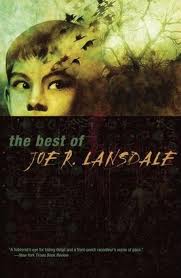 IN YOUR CAREER YOU WROTE NOVELS AND SHORT STORIES: WHICH ARE THE DIFFERENCES BETWEEN THE TWO WAYS TO WRITE?
IN YOUR CAREER YOU WROTE NOVELS AND SHORT STORIES: WHICH ARE THE DIFFERENCES BETWEEN THE TWO WAYS TO WRITE?
You write the same for both. The best you can. They each require a bit of a different mind set, but it’s impossible to explain. What’s the main difference: one is short, the other is long.
YOU ARE ALSO A COMIC BOOK WRITER: WHAT CAN YOU TELL US ABOUT THIS EXPERIENCE?
I love writing comics. The obvious thing is they were my first love as far as stories go, that and storytelling by my father and others in the family, so writing comics is the fulfillment of a childhood dream.
WHICH IS THE CONNECTION YOU HAVE WITH OTHER MEDIA, TELEVISION AND CINEMA ABOVE ALL?
Television didn’t really become popular in the fifties, though it existed before that, so I was one of the first kids to grow up during the media boom. I loved the old movies and adventure serials they played on TV, as well as detective shows, horror and fantasy series, all of it played into my imagination. I also faintly remember listening to a few radio shows. They were dying out in the fifties, but a number of them lasted into the sixties. I don’t remember too much about them, except I heard a few of them growing up. But TV certainly broadened my world and made me aware of all manner and types of stories. TV wasn’t 24 hours like it is now. But what was there that was of interest to me I watched and absorbed. Oh, and Westerns were really big on TV, and no doubt I sucked those in and was influenced by them as well. I also went to a lot of movies, and as I said there were all manner on TV. I watched science fiction, horror, crime, westerns, musicals, dramas, you name it. This led to me reading more. I wanted to understand story, and when I started reading I found the stories in books were much better than those on the screen, but I still love films, and even produced a horror film as of late. It’s low budget, but I like it. It’s based on a story of mine, adapted to screen by my son. My daughter even has a part in it and wrote part of the music. It’s a full length film, and we hope to have it out and about soon.
MOST OF YOUR BOOKS ARE TRANSLATED IN ITALY. WHAT DO YOU THINK ABOUT OUR COUNTRY?
I love Italy. It’s become like a home away from home. Just wish I could learn the language, but so far, not so much.
IN THESE YEARS YOU ALWAYS HAD A PREDILECTION FOR THE AMAZING. WHAT’S THE MEANING FOR YOU OF THIS TOPIC?
I can’t define it and won’t try, other than to say it makes me feel wonderful when I find a story of that sort that really works. It transforms me. Reading for me is like drugs for drug addicts, and I’ve always been especially impressed with the fantastic. I guess it was my way of getting away from what seemed to me to be a dreary life growing up. I knew I didn’t want to just grow up and get a job and work there until retirement. I wanted to do something different, and I suppose in one way or another, like most of us when we’re children, I wanted to be special in some way. Fantastic fiction made me feel special, and deep down I felt I could do that; that somehow I was a part of that.
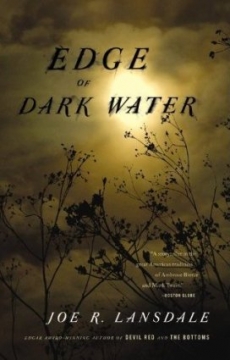 YOU WROTE ABOUT HORROR, SCI-FI, NOIR, WESTERN… WHICH IS YOUR FAVOURITE GENRE AND WHY?
YOU WROTE ABOUT HORROR, SCI-FI, NOIR, WESTERN… WHICH IS YOUR FAVOURITE GENRE AND WHY?
Science fiction was a favorite when I was younger, but frankly, I don’t read a lot of it anymore, unless it’s the older stuff. I still love it, and see science fiction films, reread old stories, something new now and again, but frankly, I don’t have a favorite genre. I like them all. I think fantastic fiction certainly gave me a different way of looking at things, even when I’m writing “realistically”.
NOW, A GENERAL QUESTION. WHERE DO YOU FIND THE ISPIRATION FOR ALL YOUR STORIES?
Everywhere.
YOU ARE ALSO A MARTIAL ARTS EXPERT, CREATING THE “SHEN CHUAN” STYLE. WHAT CAN YOU TELL US ABOUT THIS PASSION?
I became interested in self defense when I was a kid, and at eleven started training with my dad, who taught me some boxing and wrestling skills, and some self defense. I went on to study a number of arts, looked up one day and had fused it altogether and had my own style. Like a lot of my life, it was accident, though I have always worked hard at my accidents. I’m still teaching, private lessons only now, and the style is growing, slowly. We aren’t trying to be the McDonald’s of martial arts. We want to go slow and build quality. But I love it, and it’s taught me a lot about how to get things done. Focus, determination, and so on.
YOUR WIFE IS A WRITER, TOO. IS IT MORE DIFFICULT OR EASIER TO LIVE WITH ANOTHER WRITER IN FAMILY?
Karen actually isn’t a writer. She’s someone who has written a little. She helped finish a story for me I couldn’t figure out, she wrote another story with me by request of an editor, and she wrote a number of articles on The Horror Writer’s Association in the early days. She also co-edited a book with me. She prefers to handle the business, both books and martial arts. So it’s not like living with a writer. Both my kids, Kasey and Keith write, and are starting to their marks. Kasey is a song writer, and has just finished her first novel. Keith writes screenplays and comics and is a journalist.
WHICH ARE YOUR FAVORITE WRITERS?
Flannery O’Conner, Harper Lee, Mark Twain, Jack London, Richard Matheson, Ray Bradbury, Cyril Kornbluth, Charles Portis, Henry Kuttner, Ernest Hemingway, John Steinbeck, Carson McCuller, William Goldman (not Golding), Larry McMurtry, though I find him a real mixed bag. Raymond Chandler, James Cain, Dashiel Hammett. And the list goes on.
AND YOUR FAVORITE FILMS?
TO KILL A MOCKING BIRD, CASABLANCA, BUTCH CASSIDY AND THE SUNDANCE KID, recent TRUE GRIT directed by the Cohens, based on one of my favorite novels by the same name written by Charles Portis. The original film of TRUE GRIT is good, but the second is much closer to the book, and I think it’s a masterpiece.
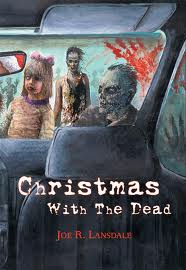 SPEAKING ABOUT CINEMA, DO WE HAVE TO EXPECT ANY FUTURE WORKS (FILM OR TV SERIES) FROM YOUR BOOKS?
SPEAKING ABOUT CINEMA, DO WE HAVE TO EXPECT ANY FUTURE WORKS (FILM OR TV SERIES) FROM YOUR BOOKS?
Yes. A lot are in the mill. You never know what gets filmed. Already filmed are BUBBA HO-TEP and INCIDENT ON AND OFF A MOUNTAIN ROAD, and CHRISTMAS WITH THE DEAD, forthcoming. I understand that THE PIT, based on my story is in production, as well as COLD IN JULY, THE BOTTOMS, and Hap and Leonard have been optioned for a cable TV show. None of the ones in progress are certain to be made, but I’m hoping. Also my new novel, EDGE OF DARK WATER, has been optioned, and several others. THE DRIVE IN was for awhile, and I was excited about that, but it collapsed.
THE LAST REQUEST. WHICH PLANS DO YOU HAVE FOR THE FUTURE AND WHICH ARE YOUR DREAMS?
Just to keep doing what I’m doing, and to keep enjoying it.
AND THAT’S WHAT WE WISH YOU, SO WE WILL CONTINUE TO READ THE AMAZING STORIES YOU HAVE TO WRITE AGAIN.
